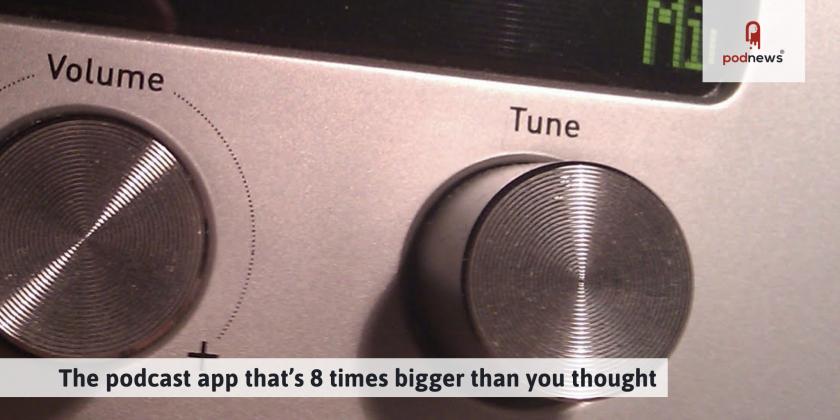
The podcast app that's eight times bigger than you thought

This article is at least a year old
TuneIn is one of the oldest and best-known audio apps, for live radio and podcasts. But it’s probably much bigger than you think.
TuneIn appears in your podcast host’s download statistics. Most podcast hosts work these figures out by looking at the user-agent, or a combination of user-agents and referrers.
According to the Open Podcast Analytics Working Group’s open user-agents list, examples of TuneIn user-agents look like this:
TuneIn Radio/24.2 (Linux;Android 10) ExoPlayerLib/2.11.4
TuneIn Radio/18.1; iPhone12,8; iOS/13.4.1 …and it’s pretty simple to spot these as TuneIn users - one on Android and one on an iPhone in the above examples.
However, TuneIn is on a lot of different platforms: from smart TVs and car dashboards to the default podcast service for Amazon Alexa. We had a hunch that the data that we were seeing from TuneIn user-agents didn’t tell the whole story.
In order to find out what audio downloads were really from TuneIn, we gave TuneIn’s directory a unique RSS feed. We tag all the audio downloads from it. That has enabled us to discover every download that came via our listing in TuneIn.
The results lead us to believe that TuneIn is responsible for eight times more downloads than previously thought.
We saw downloads from TuneIn users with a lot of default user-agents like: AlexaMediaPlayer/2.1.4184.0 (Linux;Android 5.1.1) ExoPlayerLib/1.5.9, which is the media player enclosed with the Amazon Alexa. A good amount of these were delivered via TuneIn - but many weren’t.
We also saw a lot of downloads of TuneIn-tagged audio from user-agents similar to: AndroidDownloadManager/5.0.1 (Linux; U; Android 5.0.1; GT-I9295 Build/LRX22C) - this is Android’s standard download system, and is, similarly, used by many different apps. (This listener is using a Samsung Galaxy S4 Active, by the way).
A smaller amount of requests were also seen from TuneIn clients calling themselves Lavf/57.25.100 (a user agent for ffmpeg, an audio library); and from NSPlayer/10.0.0.3702 WMFSDK/10.0 which is Windows Media Player (v10 in this case).
We also saw some requests from web browsers. These were accompanied by a referrer header showing the TuneIn website.
We have a full list of where to list your podcast on our website, including TuneIn. But our research shows that TuneIn is considerably larger than it seems. Here’s how to get listed in TuneIn.
For podcast app developers
As is demonstrated above, user-agents can be very helpful to understand where traffic is coming from: and, in this case, TuneIn has under-represented its traffic by a considerable margin.
It’s really helpful to have a best-practice user-agent for your app, to enable podcast hosts and others to accurately understand your app’s success.
Playback on Stitcher’s Alexa app is correctly marked as AlexaMediaPlayer/Stitcher (Linux;Android 8.1.0) ExoPlayerLib/2.2.0 so it appears possible to add your own user-agent to Alexa’s skills. No other service has done this, though, and it’s not immediately apparent how to set this in Amazon’s documentation.
The AndroidDownloadManager’s user-agent can also be set, by using the addRequestHeader property (some details here); but few apps do. TuneIn is using the default AndroidDownloadManager user-agent, among others.
Setting the user agent for ffmpeg is simple: just add a -user_agent 'MyUserAgent' option to your request. (An underscore in the middle, not a dash; you can also set it in the -headers option if you’d rather).
In terms of the above: TuneIn ought to be able to identify 95% of its traffic. It’s currently only identifying (for us) 12%. Potentially three lines of code could make a big difference to TuneIn’s apparent visibility in the podcasting world.
We’ve made a bug report to TuneIn (who haven’t responded).
Using the above technique, we made similar bug reports to NPR One, AntennaPod, Castbox, Headliner, Player FM and Podfollow, all of whom have added a useragent to help podcasters.

































































































